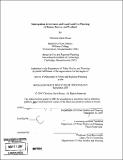Metropolitan governance and local land use planning in Boston, Denver, and Portland
Author(s)
Rosan, Christina
DownloadFull printable version (18.25Mb)
Other Contributors
Massachusetts Institute of Technology. Dept. of Urban Studies and Planning.
Advisor
Lawrence Susskind.
Terms of use
Metadata
Show full item recordAbstract
Metropolitan areas across the U.S. are characterized by sprawling development which uses larger amounts of open space than necessary, leads to the inefficient use of energy and water, increases social inequality, and causes a variety of other negative externalities. One way to prevent this type of development is to promote coordinated land use planning at the metropolitan scale. Metropolitan coordination is a challenge, however, in a country where most land use decisions are made at the local level and most states have not encouraged regional planning. This dissertation examines several different models of metropolitan coordination - or what I call metropolitan governance - and asks how they compare in term of their relative effectiveness. Given the growing interest in voluntary forms of governance, I explore whether regional planning agencies without authority are as effective at influencing local land use planning as regional planning agencies with greater authority. My research focuses on regional planning agencies in Boston, Denver, and Portland because each agency has a different level of authority over land use planning and a different level of control over certain financial tools. My hypothesis is that regional planning agencies with more tools at their disposal (such as state-mandated planning authority and the power to allocate transportation improvement funds) will be more successful at influencing local land use planning so that it meets regional goals. I find that agencies with financial and regulatory incentives are better able to engage local stakeholders and influence local land use planning.
Description
Thesis (Ph. D.)--Massachusetts Institute of Technology, Dept. of Urban Studies and Planning, 2007. Includes bibliographical references (p. 306-310).
Date issued
2007Department
Massachusetts Institute of Technology. Department of Urban Studies and PlanningPublisher
Massachusetts Institute of Technology
Keywords
Urban Studies and Planning.